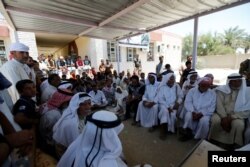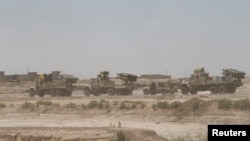Civilian casualties are beginning to mount as the battle for the Islamic State-held city of Fallujah intensifies.
"A human catastrophe is unfolding in Fallujah. Families are caught in the crossfire with no safe way out," said Jan Egeland of the Norwegian Refugee Council.
Iraqi forces have launched an offensive aimed at retaking the city.
At least 20,000 children are trapped inside the city, according to a statement released by the United Nations Children's Fund (UNICEF). The organization has urged all parties to ensure the safety of these children who risk being recruited as child soldiers.
"Children face the risk of forced recruitment into the fighting, strict procedures for security screening and separation from their families," the statement warned.
Civilian casualties
The U. N. refugee agency has received reports of civilians being killed in heavy shelling or buried alive under the rubble of their homes.
"There are also reports of several hundred families being used as human shields" by Islamic State militants, said UNHCR spokesman William Spindler.
Some 625 families have managed to escape the fighting since last week.
Iraqi forces are separating out and screening the men, out of concern about the loyalties of those who are leaving the city after living under IS rule for more than two years.
"Approximately 500 men and boys over 12 years old are held for security screening which can take five to seven days," Spindler said.
VOA spoke to one refugee, who went by the name Ayad, about the process.
"They interviewed me, the Hashd al-Shaabi and the Iraqi army," he said, referring to the umbrella group of Shi'ite militias that work in parallel with the Iraqi military.
"They said if we find your name in our data base, we will kill you. If you are in the clear, you can live with us in peace," Ayad said, speaking through a translator in a phone interview.
Hashd al-Shaabi has taken an important role in the fight against IS, and some see the pro-Iran militias as better trained than the Iraqi army.
Shi'ite fighters
But others are worried that a strong Shi'ite presence in the war against IS — whose strongholds are in predominantly Sunni areas — will only further aggravate the deep sectarian divisions that already exist in the country.
Many Sunnis in Baghdad say they live in fear of the Shi'ite militias, and human rights organizations have flagged abuses by the militias in the past.
Lawmaker and former National Security Advisor Mowaffaq al-Rubaie defended the Hashd's role in the fight against IS.
"I believe the Hashd al-Shaabi should have, and is having, a pivotal role in the liberation of our occupied territories," Rubaie told VOA.
"The Hashd al-Shaabi fight the Daesh in a guerrilla war style, not a traditional style, not like the Iraqi army," Rubaie said, using a local name for IS.
"But the Iraqi army, the federal police and even the counterterrorism [forces], they fight in a traditional way. That is why the destruction is huge," he said, referring to the fight to take Ramadi, which destroyed 80 percent of the city.
Iran's growing influence
The presence of the pro-Iranian Shi'ite militias also feeds into concerns over Iran's growing power in the region.
Iranian General Qassim Suleimani visited the Fallujah front over the weekend, raising the hackles of Sunni leaders in Baghdad.
Fallujah is a traditionally Sunni stronghold.
Kareem Nouri, spokesman for the Hashd al-Shaabi, defended the presence of Iranian advisors.
“We have American security advisors sitting in the Green Zone and we have Iranian security advisors are on the front line helping us, but only with advice. Nothing else. The Iranian advisers are more helpful than the Americans," Nouri told VOA.







